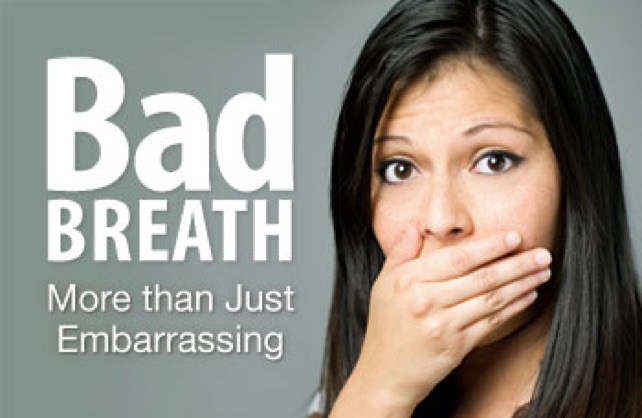Bad breath, or halitosis, is a common but embarrassing problem. Left unchecked, it can ruin social relationships, make it tougher to get or keep a job, and eventually lead to increased isolation. Some cases of bad breath are normal and short-lived, such as “morning breath,†which typically goes away when you brush your teeth. Sometimes, however, bad breath becomes chronic. If yours does not respond to typical treatments such as brushing, flossing, and mouthwash, it is time to see the dentist.
Common Causes of Bad Breath
Chronic bad breath is almost always a symptom of an underlying condition, but deciding which condition is a challenging problem best left to an expert. Below are a few common causes of ongoing bad breath:
- Gum disease: When food particles and bacteria become trapped in the gums, they can begin to break down and decay. This process is a very common cause for chronic bad breath, as the vast majority of people have at least a small amount of gum disease.
- Cracked fillings: Fillings that have begun to fail leave an open channel for food particles and bacteria to get stuck in the teeth. Like those trapped in the gums, these materials can also decay and cause odors inside the teeth.
- Poor oral hygiene: Allowing food and plaque to remain on the teeth leads to cavities, gum disease, and bad smells. Brush and floss regularly to remove these odor causers.
- Badly fitted dentures: Dentures that do not fit well allow food particles to get trapped underneath. Failing to clean your dentures properly can allow stuck-on food to remain. As the food decays, odors are a common result.
- Cavities: A cavity is literally a hole in your tooth. This provides a perfect breeding ground for odor-causing bacteria. Have all cavities filled immediately to close these points of bacteria entry.
- Dry mouth: Saliva is necessary to wash and clean the teeth between brushings. Certain medications, as well as problems with the salivary glands, can lead to chronic dry mouth.
In some cases, chronic bad breath is a symptom of an underlying health condition. These causes are much rarer, but need to be ruled out if the reason for the bad breath is not obvious:
- Oral yeast infection
- Liver disease
- Diabetes
- Chronic acid reflux
- Sinus infection
- Kidney disease
- Respiratory tract infection such as bronchitis
Diagnosing Chronic Bad Breath
At your initial appointment, you will be asked to fill out some forms and answer several questions about your past health and dental history. Then your dentist will carefully examine your mouth, head, and neck, looking for clues to the nature of your bad breath. In most cases, the dentist will find the source and treat it appropriately. If a medical cause is suspected, however, your dentist will refer you to your physician for a definitive diagnosis.
Treating Chronic Bad Breath
Chronic bad breath is a symptom rather than a disorder on its own. Therefore, treatment will focus on correcting the underlying problem. You might need to have cavities filled or failing fillings replaced. You may need to take medications to treat an infection, or change prescriptions to avoid medication-induced chronic dry mouth. Your dentures might need to be adjusted, or you might need to learn better oral hygiene practices. You may need to be treated, using either traditional methods or laser dentistry, for gum disease.
If your bad breath is due to an underlying medical illness, your doctor and dentist may work together to minimize the bad breath while you are undergoing treatment for your illness. Integrative medicine, in which multiple practitioners from different specialties work together in a comprehensive treatment protocol, is a modern approach that can have real benefits. Speak with your dentist about this possibility if you are referred to a medical doctor.
Preventing Bad Breath
Like most dental conditions, bad breath is easier to prevent than to treat. The best way to do this is to make a renewed commitment to your oral health. Brush and floss after every meal, or at least twice per day. Visit the dentist’s office for regular cleanings every six months or as prescribed. Have a full dental work-up at least once per year. Catching problems before they start is typically easier and less expensive than treating them once they’ve become an issue.

